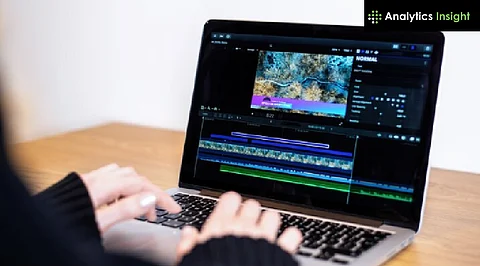

Apple MacBook Pro, Dell XPS, and ASUS ProArt lead 2025’s editing lineup.
OLED and Mini-LED displays ensure pro-level color precision.
Budget picks now offer GPU-powered performance under ₹60,000.
The information boom on the digital front keeps calling for more powerful equipment. Video editing in 4K, 8K, or VR in 2025 requires laptops that have next-generation CPUs, GPUs, and color-accurate monitors. Machines and devices make a world of difference between smooth rendering, real-time playback, and seamless multitasking.
Let's take a look at the best laptops for video editing. Prices of these laptops vary from ₹59,990 to ₹5,43,999, appealing to professionals, freelancers, and creative students alike.
Here’s a rundown of high-power machines suited to mixed editing requirements, ranging from big-scale production to mobile content creation.
Price: ₹3,89,900 onwards
Highlights
Powered by Apple Silicon M3 Max or M4 Max chips for smooth multi-layer 8K editing.
Features a 16.2″ Liquid Retina XDR display with a 120Hz ProMotion refresh rate.
Provides up to 22 hours of battery life and silent thermal performance.
Recommended for: High-end macOS workflows, Final Cut Pro editing, and professional-grade video grading.
Price: ₹3,69,000 onwards
Highlights
Based on Intel Core i9-14900H and NVIDIA RTX 4080.
Features a 17″ 4K UHD+ touchscreen with 100% AdobeRGB coverage.
Features premium build quality and Thunderbolt 4 connectivity.
Recommended for: Editors requiring a big display, color accuracy, and Windows-based software integration.
Price: ₹1,19,990
Key Features
Driven by AMD Ryzen AI 9 HX 370 and RTX 4070/5070 GPU.
Boasts a 3K/4K OLED touchscreen with the full DCI-P3 color gamut.
Features an ASUS Dial and SD card slot.
Ideal for: Adobe Creative Suite, DaVinci Resolve, and multi-monitor professional use.
Price: ₹5,43,999
Highlights
Supplies with Core i9 HX and RTX 4090 of couplets by Intel.
Dual-mode Mini LED display between 4K 120Hz and FHD 240Hz.
Top-notch vapor chamber cooling and RGB-lit CNC housing.
Ideal for: High-FPS workflows, game-engine editing, and hybrid creators.
Price: ₹2,59,000
Highlights
Intel i9 CPU with RTX 4070 and QHD+ touch screen panel.
Calibrated to 100% DCI-P3 color accuracy right out of the factory.
Lightweight and thermally optimized for constant editing.
Recommended for: Touch-enabled editing, visual storytelling, and motion graphics.
Also Read: Best Gaming Laptops Under Rs 1 Lakh: Premium Choice for Pro Gamers
Price: ₹2,35,000
Key Features
A folding hinge for sketching and editing using Surface Pen is a differentiator.
With Intel i7 and RTX 3050 Ti.
Provides a 14.4″ PixelSense screen and up to 32 GB of RAM.
Recommended for: Illustrators, animators, and hybrid creative professionals.
ASUS TUF F15 – ₹48,490
Intel i5 with RTX 3050 GPU and 144Hz display for novice editing.
Acer Swift X 14 OLED – ₹59,990
Its small size, powered by the OLED display and RTX 4060 GPU, makes it perfect for all the budget-conscious color-sensitive work.
Preferred by: Students, sole proprietors working on their own, and freelance content creators.
Most professional video editors desire these devices for their speed, precision, and mobility, as well as creative workflow performance. MacBook Pro 16″, for instance, swept the Macoko awards, seats held almost equally in the Windows category by Dell XPS and ASUS ProArt. Surface Laptop Studio 2 scores better in the multitouch and pen support category.
ASUS 15TUF and Acer Swift X are wonderful alternatives for junior editors and mobile editing scenarios. An appropriate setup makes edits smooth, renders faster, and demands fewer compromises. Consider these laptops to be the secret backstage assistant in a high-end editing suite.
Also Read: Best Laptop for Senior Citizens in 2025
1. Which laptop is best for 4K video editing in 2025?
The MacBook Pro 16″ (M3 Max) and Dell XPS 17 offer top-tier performance for 4K and above.
2. Can budget laptops handle video editing?
Yes, models like ASUS TUF F15 and Acer Swift X manage 1080p to light 4K editing efficiently.
3. Is a dedicated GPU necessary for video editing?
Absolutely; a dedicated GPU significantly improves rendering and timeline performance.
4. Are OLED screens better for editing?
Yes, OLED displays provide better color accuracy and contrast for grading and previewing.
5. Which laptop is best for Adobe Premiere Pro users?
ASUS ProArt P16 OLED and Dell XPS 17 are well-optimized for Adobe’s editing suite.
